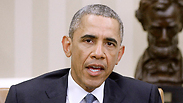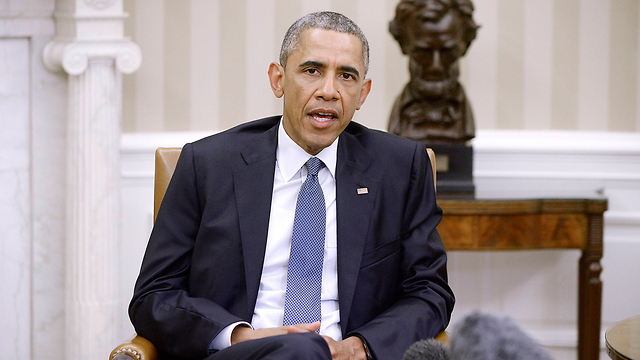
Obama: If Congress strikes down Iran deal, rockets will rain on Tel Aviv
In meeting with American Jewish leaders, president warns Israel will pay price for failure of nuclear deal with Tehran; 'American military action against Iran will not end with Tehran declaring war on us. What Iran could do is increase support of terrorism'.
WASHINGTON - US President Barack Obama told Jewish leaders on Tuesday that if the nuclear deal signed between world powers and Iran is rejected by Congress, the United States will be forced to attack Tehran, which will lead to Hezbollah retaliating with rockets on Tel Aviv.
"Israel would bear the brunt of a US military strike," Obama told 22 American Jewish leaders during a meeting at the White House.
The president asserted that if Congress votes against the agreement, the Islamic Republic will back out of it and he will then face pressure from those who oppose the deal to militarily strike Tehran.
"It would be destructive both to the US and to Israel," Obama warned. "An American military action against Iran's nuclear facilities will not result in Iran deciding to have a full-fledged war with the United States. Iran's defense budget is $15 billion. The American defense budget is $600 billion. What Iran would do, and could do, is respond a-symmetrically by increasing its support for terrorism."
"You'll see Hezbollah rockets falling on Tel Aviv," Obama said.
While Iran won't attack the United States directly, it could attack American targets across the world, or arming and funding its proxies on Israel's borders, Obama said.
The Republican-led US House of Representatives will vote on whether to reject the agreement when lawmakers return to Washington in September, party leaders said on Tuesday, setting up a showdown with the president.
Also among the roughly two-dozen leaders joining Obama in the Cabinet Room were Michael Kassen and Lee Rosenberg of the American Israel Public Affairs Committee, which is vehemently opposed to the deal, as well as Jeremy Ben-Ami of J Street, who is among the deal's most vocal proponents. The White House said representatives from the Orthodox Union, the Reform Movement, the World Jewish Congress and the Anti-Defamation League also attended.
The president said he was willing to meet with Prime Minister Benjamin Netanyahu to discuss how to increase Israel's security, "but he won't meet with me."
"Meeting me would be, for him, like waving a white flag, and Netanyahu wants us to keep fighting over the agreement," Obama said. Obama is expected to meet with Netanyahu in the next two months, but not before the prime minister's speech at the UN General Assembly meeting in New York in September.
The back-to-back sales pitches from the leaders came on the eve of a foreign policy address Obama was to deliver as he seeks to bolster support for the deal in Congress. A White House official said Obama would frame lawmakers' decision to approve or disapprove of the deal as the most consequential foreign policy debate since the decision to go to war in Iraq.
"He will point out that the same people who supported war in Iraq are opposing diplomacy with Iran, and that it would be an historic mistake to squander this opportunity," the official said.
The president's meeting with Jewish leaders, held at the White House's Cabinet Room on the president's 54th birthday, was "serious" and "cordial" but at times "contentious," according to some participants. Vice President Joe Biden, National Security Adviser Susan Rice, and Deputy National Security Adviser Ben Rhodes were also present.
While admitting the agreement was "by no means perfect," the president asserted opponents could "try and poke holes in the deal. They might find small problems but the bottom line is that this deal is good for the national security of the US and Israel."
Obama told the Jewish leaders that when he entered the white House in 2008, he decided to make it his top priority to stop Iran from obtaining a nuclear bomb. However, he decided to try to avoid war as much as possible, but clarified he "would not hesitate to use force only as a last resort."
The president said he was surprised to learn that despite talk of the military option during the Bush administration, there was no plan for such a contingency.
He therefore had to ask the Pentagon to prepare a plan for a military strike on Iran's nuclear facilities in case it is needed.
During the meeting, Lee Rosenberg, AIPAC's chairman and a close friend of Obama's, protested the fact the president presented opponents to the deal as "warmongers."
Rosenberg was backed by Conference of Presidents of Major American Jewish Organizations and chairman Steve Greenberg and vice chairman Malcolm Hoenlein.
The president told the gathered Jewish leaders that while it is their right to protest, they ought to do so based on the deal's merits.
"If you can't fight the deal on the merits you will weaken the coherence of the Jewish community and harm the US-Israel relationship," Obama said. "You can spend 20 or 50 million dollars on a campaign but you can't publish ads that say that if you are against the deal, you are a bad Jew or anti-Israel. Talk about the facts and not about what you think might help you convince people to oppose the deal."
Obama's meeting with the Jewish leaders came a few hours after participated in a live webcast aimed at Americans Jews, broadcast to synagogues and community centers across the country. Organizers said about 10,000 people participated in the meeting.
With surveys showing American Jewish opinion mixed on a dispute that has strained the US-Israeli alliance, Netanyahu cast his opposition to the Iran deal as non-partisan.
"The nuclear deal with Iran doesn't block Iran's path to the bomb, it actually paves Iran's path to the bomb," the prime minister said.
He argued that the deal gives Iran two paths to the bomb, "Iran can get to the bomb by keeping the deal, or Iran could get to the bomb by violating the deal."
"I don't oppose this deal because I want war. I oppose this deal because I want to prevent war. And this deal will bring war," he said, cautioning that sanctions relief would result in a financial windfall for Iran that could help fund destabilizing regional conflicts.
"This is a time to stand up and be counted. Oppose this dangerous deal," Netanyahu said.
Reuters and AP contributed to this report.












